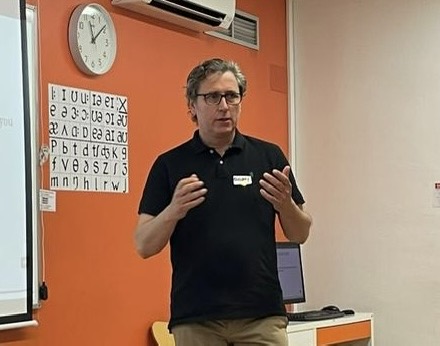How I became a Language and Communication Coach
- Barnaby Griffiths

- Mar 5, 2024
- 3 min read
Updated: Mar 7, 2024

I’ve been a Language and Communication Coach for the best part of 20 years now, having started my journey in ELT as a teacher in Japan back in 1992. Actually, that’s not true, my first English teaching job was a part-time one teaching Bavarian farmers when I was a student. I was doing a six-month work placement with Audi in Ingolstadt in 1990 in the third year of my Marketing and German Degree after completing a study period at Regensburg University. The money we received for our placement was not enough to make the most of our stay abroad, so I took a few hours a week teaching English at the local language school.
Then I travelled the world and ended up teaching for a large language school in Japan, before they made me Director of Studies and I combined teaching with running the local school branch.
After doing my TEFL Certificate back in the UK in 1994, I had my heart set on Barcelona as a place to settle down. Despite being told that the beautiful Catalan coastal city was already saturated with English teachers and searching for a job there would be futile, I scoured the newspaper for jobs (no Internet back then) until I found one at a large language school in central Barcelona. The less said about that particular establishment the better, although anecdotes still abound about the place to this day, such was its infamy when it came to how it treated teachers.
I moved on quickly, and, now with the advantage of actually living in the city, I was able to apply for local jobs. Since the life of an English teacher has always been a transient one for many, there were jobs to be had in 1995, and I worked at several schools over the coming years. In the meantime, I was also approached by Oxford TEFL Director Duncan Foord, then Course Director of a Trinity TESOL Certificate course at another school, to do some work as a tutor on the course. He’d heard that I spoke some Japanese, and asked me to take over the Unknown Foreign Language module on the course. It went so well that he soon invited me to become a Teaching Practice tutor as well.

By 1998 then, I was both an English teacher and a teacher trainer, and rather than take the plunge into the world of music as a singer songwriter, which was my dream but not something I was well qualified for, I sensibly decided to do the TEFL Diploma at International House Barcelona instead. One of my tutors was the inimitable Scott Thornbury (pictured with me here at the Madrid TESOL Spain 2023 conference), whose thought-provoking sessions sparked a desire in me to go further in the world of ELT.
Having passed “the Dip”, I approached Duncan Foord about starting our own Trinity Diploma at what was then Oxford House, and we co-wrote the syllabus and started the ball rolling on a highly successful course that is still thriving today, having trained hundreds of English teachers from around the world to the highest level.
Not one to rest on my laurels, however, I subsequently took advantage of a course I was offered at a local university teaching lecturers to devise my own courses that more adequately suited their needs than the general English courses I had been hired to teach. I gradually moulded these courses to meet the specific needs and abilities of the individuals on them, and realised that I was now no longer teaching English, but rather addressing my learners’ different communication needs, which involved a focus on emotions, skills development and strategies, rather than just language. As I developed these courses further and signed up for coaching and emotional intelligence courses myself, I came to understand that what I was doing was a mixture of teaching and coaching, so I gave it the name Language and Communication Coaching. I hadn’t heard the name previously, although Language Coaching is now a widely-used term of course.

Since those early days, I have thrived and made an excellent living providing university lecturers, business school teachers, journalists, businesspeople and even politicians with English Language and Communication Coaching. But I didn’t want to stop there, so I decided to break down all those years of experience into an 8-hour self-paced online video observation course that combines the four pillars of my method to help teachers become Language and Communication Coaches. The course provides trainees with the most effective Language and Communication Coaching techniques from the fields of language teaching, language acquisition, oral communication skills development and life coaching, as well as practical advice on how to set yourself up and prosper as a Language and Communication Coach.
For further details of the main course and its offshoot mini-courses, visit this link.

Comments